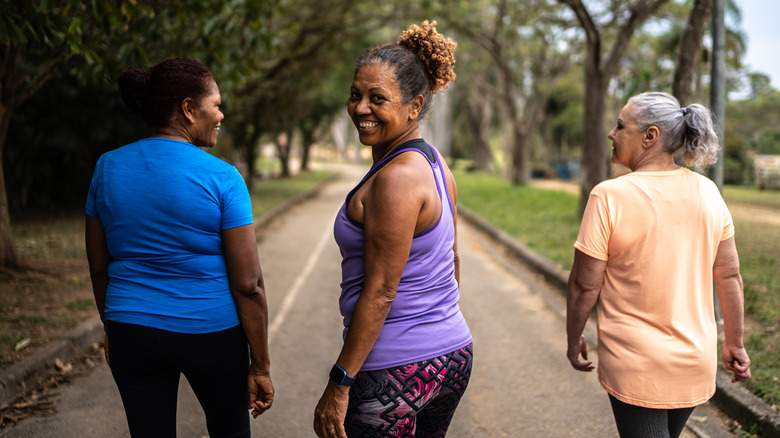16 Benefits Of Simply Taking A Walk Everyday
In an era filled with demanding schedules, constant multitasking, and the perpetual juggling act of modern life, the simple act of taking a daily walk often goes overlooked. Yet, embracing this uncomplicated activity can unlock a treasure trove of physical, mental, and emotional benefits that not only enhance overall well-being but empower you to face life's challenges with renewed vigor.
While the advantages of walking are universally applicable, there are unique perks for women that make it a beneficial addition to your self-care regimen. Whether you're a working professional, a busy mother, or someone simply looking to boost your quality of life, incorporating a daily walk into your routine (whether that be first thing in the morning or on your lunch break) can have a transformative impact on your well-being. From improved physical health to enhanced mental resilience, here are 16 remarkable benefits of taking a daily walk. So, let's lace up our walking shoes and embark on a journey toward a healthier, happier, and more empowered you.
Boosts immunity
Stepping out for a daily 30-minute walk isn't just good for your health — it also provides an immunity supercharge for your body. Whether you fancy a leisurely outdoor jaunt or prefer to get your groove on with a treadmill, a 1994 study found that the simple act of walking can work wonders for your immune system.
A team of researchers in 2018 may have discovered the key to how this works. They found that walking increases antimicrobial activity in the blood, which can improve immune system function. This is true even for elderly populations, meaning that the benefits of walking don't discriminate based on age.
Relieves menstrual cramping
For many individuals, enduring the agony of menstrual periods is a significant and all too familiar challenge. And severe menstrual cramping, a condition medically known as dysmenorrhea, affects an estimated half of all women.
While it's widely acknowledged that exercise can be a powerful ally in the battle against period cramps, the mere thought of engaging in high-intensity interval training during those discomforting days of the month might seem nothing short of unbearable. The good news is that relief doesn't have to entail rigorous physical activity. In fact, a gentle stroll for as little as thirty minutes during the first three days of your menstrual cycle can work wonders in reducing the intensity of menstrual pain, as demonstrated by a 2012 study.
But here's where the true magic unfolds: a 2018 review reported that those who incorporate regular walks as a part of their routine throughout multiple menstrual cycles report remarkable benefits. They experience not only a significant reduction in the severity of pain but also find that the painful episodes become shorter in duration. So, you don't have to push yourself to the limit with high-intensity workouts to find relief — simply lace up your walking shoes and stride your way to more manageable periods and a brighter, pain-free future.
Aids in hormonal balance
Walking holds the power to positively influence hormonal balance in women. Regular walking can have a significant impact on various hormones within the female body. It helps to regulate insulin levels, making it an effective strategy in managing conditions like polycystic ovary syndrome (PCOS) and reducing the risk of developing type 2 diabetes.
Additionally, walking aids in the production of endorphins, those wonderful "feel-good" hormones that alleviate stress and enhance mood. For those looking to drop a few pounds, walking has also been shown to directly influence hormones that control our appetite. The physical benefits of walking, such as weight management and muscle toning, contribute to a more balanced hormonal environment. This harmonious interplay between walking and hormones underscores its importance as a holistic approach to women's health, supporting overall well-being from the inside out.
Increases pelvic floor strength
A 2020 study found that walking plays a vital role in reducing incontinence and supporting pelvic floor strength. The pelvic floor, a group of muscles that acts as a hammock supporting the bladder, uterus, and bowel, can weaken over time due to factors like pregnancy, childbirth, aging, and obesity. Weakening of the pelvic floor muscles can lead to urinary incontinence issues.
Regular walking helps to strengthen these essential muscles, even more than strenuous forms of activity that can create stress or even prolapse of the pelvic organs. As you walk, the gentle, repetitive movements naturally activate and engage the pelvic floor, aiding in toning and improving endurance. Stronger pelvic floor muscles can better support the organs in the pelvis and reduce the likelihood of urinary incontinence, including stress incontinence, where leakage occurs during activities such as sneezing, coughing, or lifting.
Furthermore, walking assists in maintaining a healthy body weight, reducing pressure on the pelvic floor. This is crucial because excess weight can exacerbate incontinence issues. By incorporating walking into your daily routine, you can help ensure your pelvic floor remains robust, which not only enhances your overall quality of life but also empowers you to enjoy every step without worries about incontinence.
Improves breast health
The simplicity of walking conceals its profound impact on maintaining breast health and mitigating the risk of specific conditions, notably breast cancer. While regular physical activity has long been recognized as beneficial for overall health, recent research has unveiled a more intricate connection between exercise and breast health.
A study conducted by researchers at Texas A&M sheds light on the remarkable relationship between walking and breast health. They discovered that walking triggers the release of a signal that actively hinders the formation of tumors. This fascinating phenomenon is attributed to the physical muscular contractions that walking necessitates. What's even more intriguing is that the duration of one's walk directly correlates with the amount of this tumor-suppressing signal that the body releases. In essence, the longer individuals walk, the more potent their body's defense becomes against the development of breast tumors. This revelation underscores the potential of a daily walk as a proactive and effective strategy for bolstering breast health, demonstrating the profound influence of this seemingly simple exercise.
Supports postpartum recovery
Pregnancy and childbirth bring about significant changes in a new mother's musculoskeletal system, largely influenced by the hormone relaxin, which causes a laxity in muscle ligament that can persist for up to three to four months post-delivery. For mothers looking to return to their pre-pregnancy shape or ability, it becomes pivotal to embark on a manageable exercise regimen to improve post-natal health. But, where should you start?
A walking program proves to be an excellent way for new mothers to reintroduce cardiovascular activity and shed post-pregnancy weight, with the added benefit of walking being a more gentle option compared to immediate post-partum running. In addition, many postnatal women find joy in participating in walking groups, offering the advantage of social interaction and support between new mothers. This social benefit of group walking programs become more prevalent for individuals with postpartum depression (PPD). A 2022 analysis suggests that walking can be an effective means for mothers to manage PPD, highlighting the holistic benefits of walking on women's wellness.
Improves bone health
Walking plays a crucial role in enhancing and maintaining bone health. Weight-bearing exercises, such as walking, subject bones to a healthy level of stress, which in turn stimulates bone growth and density. Though we tend to think of dumbbells or barbells when envisioning strength training, bodyweight exercises like walking also provide tremendous benefits. Over time, even a daily walk can significantly reduce the risk of fractures, especially in women who are more susceptible to bone loss and conditions like osteoporosis.
Regular walking also improves balance and coordination, reducing the likelihood of falls and fractures. This is particularly important for older adults who may experience a decline in bone density and muscle mass. Moreover, walking outdoors provides exposure to natural sunlight, allowing the body to produce vitamin D, which is essential for calcium absorption and bone health. It's a comprehensive approach that not only strengthens bones but also contributes to overall well-being, making walking a vital component of a healthy lifestyle. The greatest part about it all is that it doesn't matter how fast you walk. A 2023 study found it's about how much you walk, not how fast you get there, that endows the most benefits to bone health.
Improves emotional health
Walking, particularly in natural, rural settings, offers a significant boost to emotional well-being. A 2011 study showed that strolling in the countryside is especially beneficial for emotional and cognitive restoration, providing benefits for individuals in various health groups when compared to urban walks. The serene and peaceful atmosphere of rural landscapes fosters a sense of calm and tranquility, offering a much-needed respite from the stressors of modern life. This immersion in nature has the remarkable ability to soothe the mind, offering a mental escape that can feel almost meditative.
Studies have even shown that a walk in the park can lead to changes in the workings of our brains, resulting in improved mental health. Natural environments seem to have a unique way of reducing symptoms of depression and anxiety, enhancing mood, and promoting overall emotional well-being. The sights and sounds of the outdoors, the fresh air, and the connection with the natural world contribute to a sense of rejuvenation and restoration, making walking in rural settings a potent tool for nurturing emotional health and improving the quality of our lives.
Facilitates social connection
As we increasingly rely on social media for entertainment and engagement, the world has also become increasingly lonely and isolated. Social isolation is known to have significant detrimental effects on the body, from disturbed sleeping to mental illness. It's unexpected, but researchers claim that walking can help address these issues.
Walking serves as a potent catalyst for nurturing social connections, especially within the context of our neighborhoods, where these bonds hold pivotal significance. Neighborhood social ties provide a vital avenue for community members to engage in genuine and meaningful interactions with their neighbors, thereby granting access to essential resources like information, material goods, and the invaluable support network that is our social community.
Whether you join a walking group or stroll through your neighborhood streets, the act of walking within our neighborhoods strengthens the social fabric of our communities but also combats the epidemic of isolation that plagues our modern age. By simply stepping outside and engaging with our neighbors through walking, we fortify the bonds that sustain us and contribute to our collective well-being.
Encourages healthy digestion
Taking a stroll after a meal, whether it's a leisurely post-dinner walk or a brisk jaunt, can stimulate the digestive system and promote more efficient nutrient absorption. As we move, the muscles in our abdomen gently massage the intestines, facilitating the movement of food and waste through the digestive tract. This physical activity can help reduce bloating and discomfort, while also preventing constipation by encouraging regular bowel movements. Moreover, walking can alleviate stress, which can be a common trigger for digestive issues, by promoting the release of endorphins. In this way, daily walks serve as a natural and enjoyable way to support your digestive health, contributing to an overall sense of well-being.
Improves sleep
Walking is not just an activity for your daytime routine; it's also a key player in enhancing the quality of your sleep. Regular, moderate to intense walks can work wonders for improving your sleep patterns. By engaging in this simple exercise, you can help regulate your circadian rhythms, making it easier to fall asleep and stay asleep throughout the night.
Walking also contributes to the release of endorphins, which have a calming effect on your mind, reducing stress and anxiety that often disrupts sleep. Moreover, it can help with weight management, reducing the likelihood of conditions like sleep apnea that can impede restful sleep. This was found by a group of researchers in 2007 who saw demonstrable benefits of walking on sleep patterns in women who were at risk for heart failure, and even for individuals who had cancer. Walking improved their sleep and led to an increase in health outcomes over a long-term period. So, lace up your walking shoes and take those evening strolls — they might just be the path to sweeter dreams.
Improves skin health and condition
Walking can also do wonders for your skin. When you're out for a walk, your body's circulation increases, delivering oxygen and nutrients to your skin cells more efficiently. This increased blood flow helps boost healthy cell growth in organs including your skin.
Additionally, we know that regular walking can help reduce stress levels, which can lead to skin issues like acne and premature aging. As you de-stress, your skin is less likely to break out. Plus, spending time outdoors while walking allows your skin to soak up natural sunlight, which can boost your vitamin D levels and improve skin conditions like psoriasis and eczema. So, the next time you step out for a walk, know that you're not just doing your body good on the inside — you're giving your skin a beauty boost too.
Promotes a healthy pregnancy and delivery
Walking can be a wonderful companion throughout pregnancy, contributing to a healthier and smoother journey for both the expecting mother and the baby. Engaging in a regular walking routine during pregnancy can help maintain physical fitness, manage weight, and alleviate discomfort associated with pregnancy-related changes. It can also boost circulation, reducing the risk of complications like varicose veins and swelling.
Furthermore, walking is a low-impact exercise that is generally safe for most pregnant women, making it an excellent choice for staying active. It can improve posture, balance, and flexibility, preparing the body for the physical demands of labor and delivery. Additionally, the endorphins released during walking can enhance mood and reduce stress, which are essential for mental well-being during pregnancy. As the due date approaches, and even right into those final moments, walking can play a role in promoting optimal fetal positioning, potentially reducing the likelihood of challenging labor.
Overall, incorporating regular walks into a pregnancy routine can significantly contribute to a healthy and smoother pregnancy and delivery experience. However, it's crucial to consult with a healthcare provider to ensure that the walking routine is safe and appropriate for the specific circumstances of each pregnancy.
Alleviates menopausal symptoms
Regular walks can help alleviate a variety of menopausal symptoms and contribute to overall well-being. For starters, walking promotes weight management, which is crucial during this phase, as hormonal changes can lead to weight gain. Maintaining a healthy weight can reduce the severity of hot flashes, a common and uncomfortable symptom of menopause.
Furthermore, walking aids in reducing stress and anxiety, addressing mood swings and irritability often experienced during menopause. The release of endorphins during exercise can have a positive impact on mood and mental health. The best part is that the more you walk, the more benefits you will reap, according to a 1996 study that found a correlation between the amount of walking and positive health outcomes.
Walking also supports heart health, which becomes increasingly important for women during and after menopause, as they face an elevated risk of cardiovascular issues. The overall enhancement in physical fitness and bone health brought about by regular walking can also mitigate other age-related concerns, such as osteoporosis. In summary, incorporating walking into your daily routine can offer a wide range of benefits for women dealing with menopausal symptoms, providing a natural and effective way to navigate this phase with grace and improved well-being.
Enhances libido and sexual satisfaction
Walking can have an unexpected but delightful effect on your libido and sexual satisfaction. Engaging in regular physical activity like walking enhances overall blood circulation, including to the pelvic region, promoting better sexual function.
By improving cardiovascular health, walking can lead to better endurance and stamina, which can contribute to more enjoyable and longer-lasting intimate moments. Additionally, the release of endorphins during physical activity can elevate mood and reduce stress, which can be a major factor in boosting sexual desire and satisfaction. So, as you open your door for a walk, know that you're not only taking care of your physical health but also enhancing your sexual well-being.
Improves self-esteem and confidence
Walking is more than just a physical activity; it's a transformative journey for your self-esteem and confidence. When you walk regularly, you not only enhance your physical health but also nurture a positive self-image.
First and foremost, walking fosters weight management. Achieving and maintaining a body weight that you're comfortable with can lead to improved self-esteem and a greater sense of self-worth.
Moreover, the mental benefits of walking cannot be overstated. As you stroll along, the release of endorphins, those wonderful "feel-good" hormones, boosts your mood and reduces stress. This emotional balance can significantly bolster your self-confidence, making you more self-assured in your abilities and appearance. Additionally, setting and achieving walking goals, whether it's walking a certain distance or increasing your pace, can empower you and provide a sense of accomplishment, further fueling your self-esteem.
In essence, walking serves as a holistic self-improvement tool, enhancing both your physical and mental well-being and, in turn, fostering a stronger sense of self-esteem and self-confidence. So, take those steps to a happier and more confident you.
















